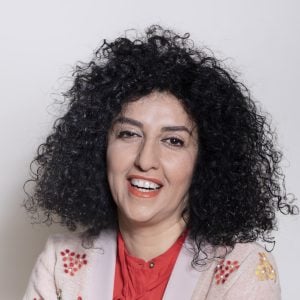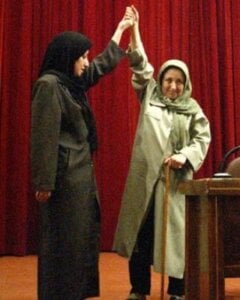Narges Mohammadi
Speed read
The Nobel Peace Prize for 2023 was awarded to Narges Mohammadi for her fight against the oppression of women in Iran and her fight to promote human rights and freedom for all.

Full name: Narges Mohammadi
Born: 21 April 1972, Zanjan, Iran
Date awarded: 6 October 2023
Women’s rights advocate and freedom fighter
For many years, Narges Mohammadi has fought against the systematic discrimination and oppression of women in Iran. She is at the forefront of acourageous fight for human rights, freedom, and democracy. As early as the 1990s, Mohammadi began her fight for equality and women’s rights. In 2003 she became involved with the Defenders of Human Rights Center in Tehran, an organisation founded by Nobel Peace Prize laureate Shirin Ebadi. Mohammadi has assisted incarcerated activists and their families. She has been active in campaigning against the death penalty and against the regime’s systematic use of torture and sexualised violence in Iranian prisons.
This year’s peace prize also recognises the hundreds of thousands of people who, in the preceding year, have demonstrated against the theocratic regime’s policies of discrimination and oppression against women.

”Standing alongside the brave mothers of Iran, I will continue to fight against the relentless discrimination, tyranny and gender-based oppression by the oppressive religious government until the liberation of women.”
- Narges Mohammadi, New York Times 6 October 2023
| The theocratic regime in Iran A theocracy is a form of government in which religious leaders rule society. After the 1979 revolution, Iran became an Islamic republic. The Iranian state is governed by Islamic scribes. Since 1979, the country has had two Ayatollahs (spiritual leaders) as its supreme leader: Ayatollah Khomeini (1979-89) and Ayatollah Khamenei (from 1989 to the present). The Ayatollah controls the judiciary, the media, the police and the military. The Iranian constitution of 1979 states that Islamic law, sharia, stands above all laws in society. |
Refuses to be stopped
Mohammadi’s brave struggle has come at tremendous personal cost. Altogether, the regime has arrested her 13 times, convicted her five times, and sentenced her to a total of 31 years in prison and 154 lashes. She has been imprisoned in Evin prison, in Tehran, since 2021.
The Iranian regime restricts its people’s freedom to dress as they wish and express themselves as they wish. The authorities do not allow criticism, and critics risk being imprisoned, tortured and killed. With such strict laws, many people are forced into silence. Mohammadi however, and many with her, still do not allow themselves to be silenced.
”Only by embracing equal rights for all can the world achieve the fraternity between nations that Alfred Nobel sought to promote.”
- Berit Reiss-Andersen, Nobel Peace Prize announcement, 6 October 2023.
“Woman – Life – Freedom”
In September 2022, 22-year-old Mahsa Jina Amini was killed while in the custody of the Iranian morality police. Her killing triggered the largest political demonstrations against Iran’s theocratic regime since it came to power in 1979. Under the slogan “Woman – Life – Freedom”, hundreds of thousands of Iranians took part in peaceful protests. The protesters’ demands for freedom did not apply only to women, but to the entire population. The regime cracked down hard on the protests: more than 500 demonstrators were killed, several thousand were injured and at least 20 000 people were arrested.
The wave of protests became known to Mohammadi and the other political prisoners held inside the Evin prison. From captivity, she organised solidarity actions among the inmates and has helped to ensure that the protests have not ebbed out.
”No prison wall has been able to prevent the voice of Narges Mohammadi from reaching the people.”
- Shirin Ebadi, in her foreword to Narges Mohammadi’s book ‘White Torture’, 2020.
| Morality police The Iranian morality police are a part of the country’s police force. They are responsible for ensuring that the population behaves and dresses decently and morally. |
| Human rights Rights that apply to all persons regardless of gender, race, ethnicity, religious affiliation or nationality. The most important are the rights enshrined in the UN Declaration of Human Rights, adopted in 1948. |
Learn more
Nobel Peace Prize award ceremony 2023.
Photo: Jo Straube
Disclaimer: Every effort has been made by the publisher to credit organisations and individuals with regard to the supply of photographs. Please notify the publishers regarding corrections.
Nobel Prizes and laureates
See them all presented here.

